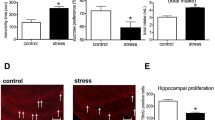Abstract:
Calcitonin, one of the calcium-regulating hormones, is known to have diverse biological effects including those on the gastrointestinal tract. In this organ, the hormone is reported to inhibit gastric acid secretion, gastric motility, and gastrin secretion and to stimulate release of somatostatin, thereby exerting antiulcer and antilesion effects on stress-induced as well as other types of experimental gastric ulcers or lesions. This fact prompted us to examine changes in serum calcitonin concentration during the development of stress-induced gastric lesions in rats. DA rats were constrained in a stress cage after a 24-h fast and then immersed in 24°C water to the level of the xiphoid process for 2 or 5 h. Serum calcitonin concentrations in stressed rats were significantly lower than those in control rats. To investigate the mechanism of the decline in serum calcitonin level under stress in these rats, we conducted a time-course study of serum calcitonin concentration and ionized calcium level during water-immersion stress, lasting 2 h, and during 4 h following release from the stress. Water immersion caused a remarkable decrease in serum calcitonin concentration as early as at 30 min. After release from stress, serum calcitonin concentration gradually recovered. The ionized calcium level in the blood did not change significantly throughout the experimental period. Furthermore, to examine if the sympathetic nerve system was involved in the stress-induced change of serum calcitonin concentration, α- and β-receptor antagonists were administered intraperitoneally before stress exposure. Administration of α-receptor antagonist at a low dose that did not have any effect on serum calcitonin concentration in a preliminary study, restored the decline of serum calcitonin level, whereas β-receptor antagonist did not. These results suggest that stress-provoked decrease of serum calcitonin concentration may be mediated not by a change of ionized calcium level but by alteration of sympathetic nerve activity (particularly via the α-receptor).
Similar content being viewed by others
Author information
Authors and Affiliations
Additional information
Received: Feb. 12, 1999/Accepted: June 14, 1999
About this article
Cite this article
Fujimoto, K., Fujimoto, H. & Ohata, M. Changes of serum calcitonin in stress load. J Bone Miner Metab 18, 22–26 (2000). https://doi.org/10.1007/s007740050005
Issue Date:
DOI: https://doi.org/10.1007/s007740050005




